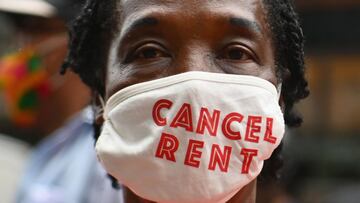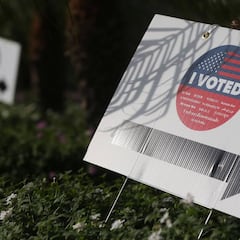US unemployment benefits: which states still pay $300 extra?
Republicans and Democrats continue talks on a new stimulus deal, while the first check means several states still offer $300 extra unemployment benefit.

The last of the extra $300 weekly unemployment payment is being paid out in a handful of US states, leaving millions of Americans waiting anxiously for news on further relief funds for the stalling US recovery.
The scheme referred to as Lost Wage Assistance (LWA), a program approved by President Donald Trump with FEMA funds, was created to help Americans who were left unemployed due to the covid-19 pandemic after funds from the CARES Act ($600 weekly) expired in July.
Negotiations for more stimulus money have been ongoing now between Democrats and Republicans since July. Drama ramped up in the weeks leading up to the election, as both parties vied to place blame and sow hope to gain last minute votes. Now that Joe Biden has won the election there appears to have been no progress on further pandemic relief, though talks have now resumed. At the time of writing Donald Trump is yet to accept his loss of the presidency.
Which states are still paying the $300 bonus?
The Trump-backed LWA benefits were approved to run for six weeks starting retroactively on 1 August. Arizona was the first state to send out the $300 bonus on 17 August but has now depleted its funds. A total of 49 states were approved for the LWA. South Dakota
The states that already received and sent out the funds to unemployment recipients have now reached their six weeks, meaning they will soon run out of funds.
The government also called on each state to provide an additional $100, for a total of $400 per week in enhanced unemployment pay, but most states rejected the option to pay the $100 top-up, only 3 states Kentucky, Montana and West Virginia paid out the extra funds.
Most states have stopped offering the $300 bonus. These are the ones that remain with links:
What's the latest on talks over a second stimulus bill?
JUST IN: Senate panel proposes $696 billion Pentagon spending bill https://t.co/Jp7KUfTWQj pic.twitter.com/2VBLSELDYA
— The Hill (@thehill) November 10, 2020
Trump told reporters on 30 October, "we will have a tremendous stimulus package immediately after the election." He has yet to bring up the discussion of a stimulus bill since his loss was declare on Sunday. Joe Biden has now won the election by an overwhelming number of electoral college seats, and his stimulus plan does make provision for more unemployment support, but does not go into detail of how much.
Since July, both sides have struggled to agree on the cost of a new bill. Negotiations have dragged on over the past months. The White House increased their offer stimulus package to $1.9 trillion in October, still nowhere near the $2.2tn that Pelosi's Democrats are demanding, and almost $1tn more than many Republicans are willing to accept.
What’s not clear is what the road map is going forward, with Senate Republicans Yesterday Senate Majority Leader Mitch McConnell said about offering a higher total amount, "that's not a place I think we're willing to go. But I do think there needs to be another package. Hopefully we can get past the impasse we've had now for four or five months and get serious."
"It has been our position all along to crush the virus, honor our heroes, put money in the pockets of the American people," House Speaker Nancy Pelosi said during a press conference on Thursday, "this is what we put in the Heroes Act to crush the virus."
Since pharmaceutical giant Pfizer announced that its coronavirus vaccine has a 90% effectiveness rate, commentators are concerned that a large check will now be stalled until after January.
We are praying that the early evidence of vaccine efficacy & safety holds true so that the vaccine can be approved—not one day sooner or later than it is ready.
— Nancy Pelosi (@SpeakerPelosi) November 9, 2020
Until then, we must crush the virus with testing, tracing, treatment, mask wearing & social distancing to save lives.
Who is eligible for the additional unemployment check?
Not every unemployed person in every approved state or territory will receive LWA funds. In order to get the extra $300:
- You must have been eligible for unemployment as of 1 August, 2020.
- Your regular weekly unemployment benefit must be at least $100.
- You must have become unemployed or had hours reduced due to covid-19 pandemic.
Beyond stated eligibility standards, it's up to each state or territory to decide what you need to do to receive the money. Best advice is to check with your state unemployment office.
Who is eligible for unemployment benefits?
Normally, unemployment benefits are reserved for full-time employees who lose their jobs. With the expanded coverage, part-time and self-employed workers may now qualify.
The Cares Act created the Pandemic Unemployment Assistance program (PUA), which provides benefits to citizens who would not normally be eligible for unemployment benefits from the states, including gig workers, freelancers, independent contractors and small business owners whose income has been affected by covid-19. For now, PUA funding is set to run through 31 December.
You may also be eligible to collect unemployment benefits if:
- You or a family member have been infected by covid-19 and cannot work.
- You have been advised by a doctor to self-quarantine.
- Your workplace closed due to the coronavirus.
Related stories
- You're not working because you have to care for children or other family members who would otherwise attend school or another facility.
- For college students who worked a job last year - even a part-time one.

